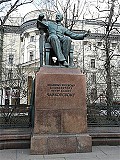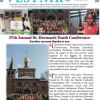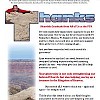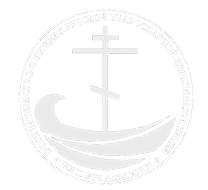Concert season in Moscow this fall will include an event which can hardly be expected to pass without the widespread media coverage and publicity.
On Wednesday, September 27, 2017, the Moscow Conservatory, one of Russia’s premier musical institutions, will present a concert of Russian sacred music in its Rachmaninoff Hall, the performance venue for the choir of the Moscow Synodal School until its closure in 1918.[1] This hall, with its cathedral-like acoustics, is especially suited to this music.
The concert will consist of works by composers who wrote outside the borders of their homeland. The majority of masterworks on this program will be sung in Russia for the first time in an effort to offer a repertoire not only neglected during the Soviet era, but even disparaged and publicly vilified. The audience will have an opportunity to experience the distinctive quality of these compositions and their uniquely prayerful sound.
From the beginning, this project has been a collaborative effort, bringing together the artistry of accomplished church musicians and conductors with the latest in scholarly knowledge and research. Some fifty singers from different choral groups in Moscow will come together for the evening’s occasion. Foremost among them will be the Kastalsky Male Chamber Ensemble, which has already received overwhelming acclaim from critics and concertgoers throughout Russia and Europe. For purposes of this concert, the Moscow Conservatory faculty and the ensemble’s director, Alexei Rudnevsky, will enlarge the group to include about twenty women’s voices.
Peter Jermihov, a Russian-American conductor widely known for his brilliant choral technique, especially in the Russian sacred tradition, will rehearse and conduct the expanded choir. In addition, Rudnevsky will lead the Kastalsky Male Chamber Ensemble in an epilogue consisting of selections by a handful of composers who continued to write in Russia, echoing the efforts of their compatriots in exile.
Important consultants to the project are Vladimir Morosan, editor and publisher of the multi-volume series Monuments of Russian Sacred Music (originally launched with the support of Mstislav Rostropovich and Alexander Solzhenitsyn in Washington, DC, 1991), and noted music historian and author of leading publications on Russian church music, Nicolas Schidlovsky (Ph.D., Princeton University). Their rare expertise, including knowledge of the history and extensive archival sources, has laid the groundwork for the evening’s program. This will include the works of such celebrated composers as Alexander Gretchaninoff, Alexander Chesnokov, Nikolai Tcherepnine, Boris Ledkovsky, Alfred Swan, Andrei Ilyashenko, Johann von Gardner, and Mikhail Konstantinov.[2] Listeners will be given a superb introduction to this music, covering all facets of its splendid character and style.
Spotlighting 100 Years of Sacred Music in the Emigration
The great renaissance of Russian church singing and sacred composition, or the “new direction” as it came to be known, began in the final decades of the nineteenth century and continued through the first two decades of the twentieth until its suppression by the torrent of religious persecutions in the 1920s and beyond. In line with the original vision for this project, the concert will directly address this question, and its chief organizer, initiator, and host, the Moscow Conservatory, will accomplish this with the vital input of overseas specialists. The funding being sought by the Russian Choral and Liturgical Music International Bulletin (RCLMI) and the Russian Orthodox Theological Fund (ROTF) will assist this participation.[3]
This fall’s concert season in Moscow can hardly be expected to pass without the widespread media coverage and publicity that will be inspired by this event. During the remaining months before September, the breaking news will spread quickly and reach deeply into the hearts of many individuals, above all, those currently in search of a perspective on the one hundred years since 1917 Revolution.
Support of this project can be extended through a tiered co-sponsorship program with attractive benefits and secure on-line gift payment. For details see the Donor Information sheet, which is also posted on the “Make A Gift” tab of the RCLMI website www.rclmi.org. For further inquiries, please send your email to: choralsoundings@gmail.com.
RCLMI
P.O. Box 537
Princeton, NJ 08542-9998
[1] Centrally located in Moscow on Bolshaya Nikitskaya Street, two minutes from the Kremlin, the Rachmaninoff Hall is emblematic — a vestigial reminder of Russia’s world-renowned choral institute prior to the Revolution.
[2] Virtually all the composers on the program would have held this concert’s location in deepest esteem, most of their works being written, at the very least, as a token of enduring affinity with the Moscow Synodal School and its aesthetic that retains significance to this day.
[3] The ROTF is a registered 501(c) (3) organization in New York. Since its founding in 1955, it has been a leader of many outstanding initiatives in Russian émigré culture and education. Your gift will be tax-deductible to the full extent of the law.
|




